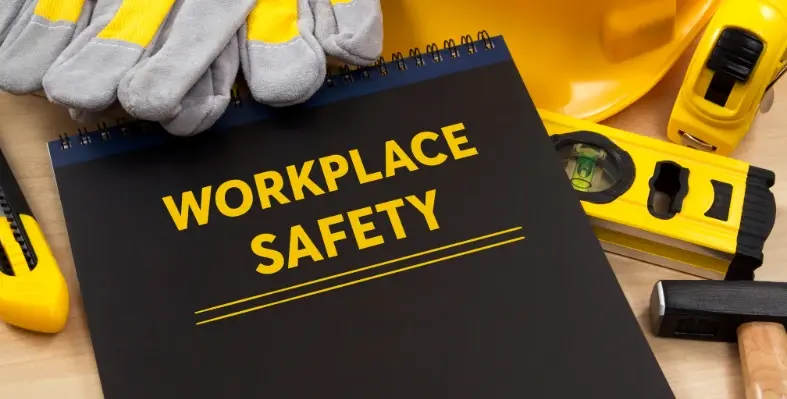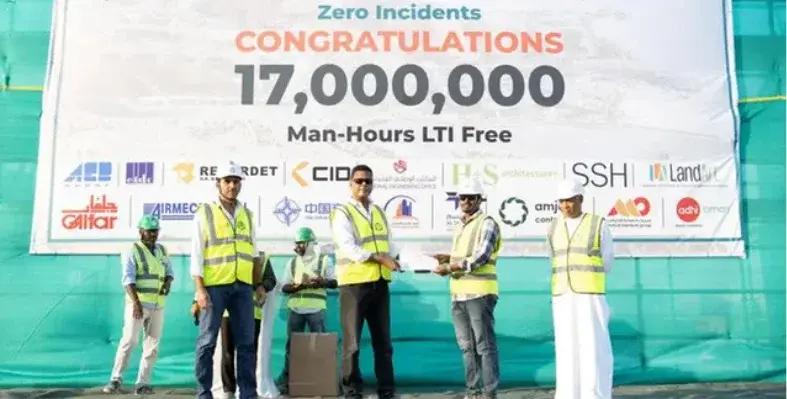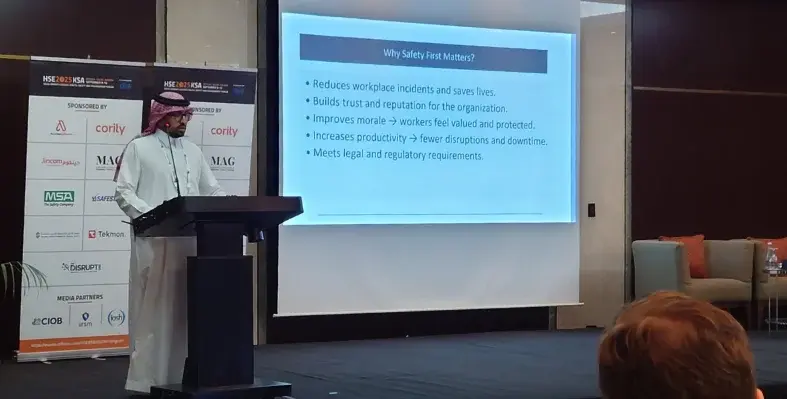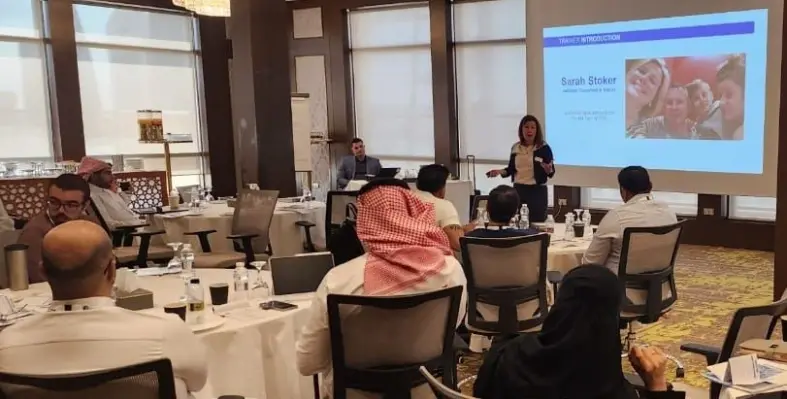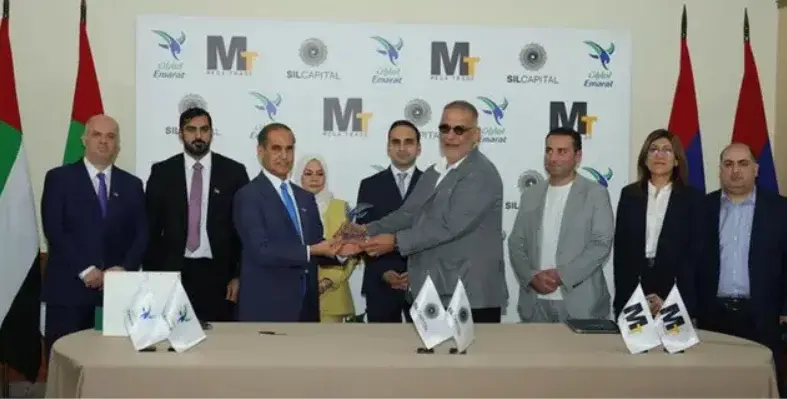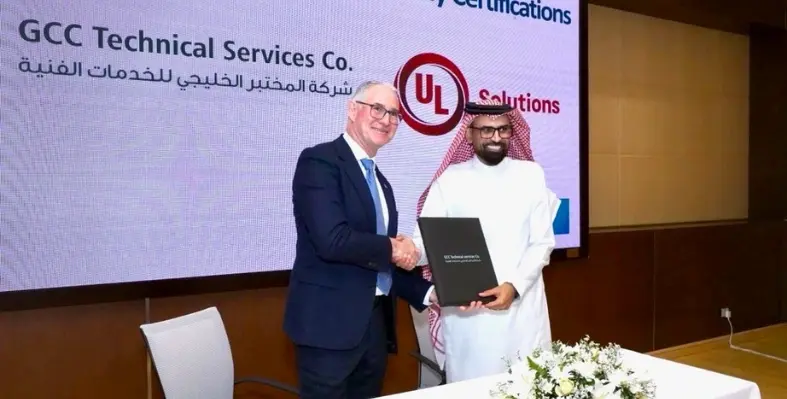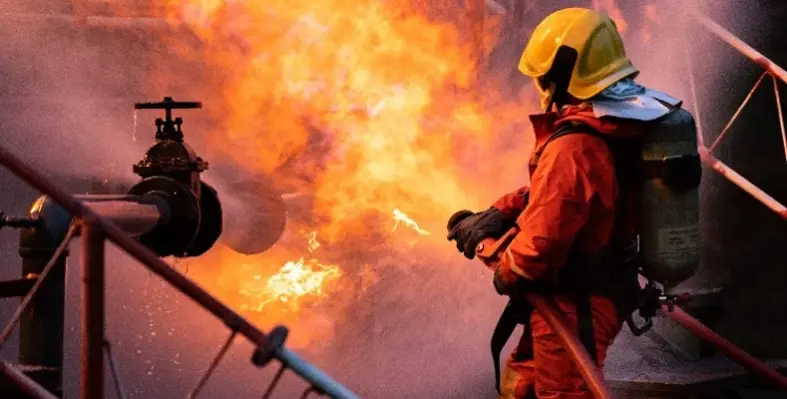Regional Coverage
Regional Coverage
- Details
- Sania Aziz
- North America
- Region: North America
- Date: 12th November 2025
- Year: 2025
The Voluntary Protection Programs Participants’ Association (VPPPA) has announced the renewal of its strategic partnership with Clear Audit Management (CAM), a digital audit platform that helps current and prospective VPP sites enhance, standardise, and modernise processes related to OSHA’s Voluntary Protection Program.
Through this partnership, VPPPA members will gain access to exclusive resources, insights, and special offers designed to support their safety and compliance goals, including discounted access to the CAM platform.
By utilising CAM’s audit management system, members can streamline internal safety audits, identify potential hazards more efficiently, and drive continuous improvement across both VPP and non-VPP sites.
“This renewal represents momentum,” said Kristen Denney, director of strategy at Clear Audit Management. “We’ve built a strong foundation, and now we’re ready to increase our impact through our technology that streamlines compliance and promotes continuous improvement for active VPP sites, those preparing to apply to the programme, and supporting sites through their Journey Towards Safety Excellence.”
“This partnership renewal between VPPPA and Clear Audit Management reaffirms the shared vision of advancing health and safety excellence through making the audit process—a critical component of continuous improvement—more efficient for both sites and auditors alike,” said Chris Williams, VPPPA executive director. “This allows us to continue our mission to raise the standard for workplace safety and health excellence across the country.”
- Details
- Matthew Hayhoe
- Middle East
- Date: 12th December 2025
Tela, an agentic AI assistant, will be embedded across the SLB software and platform, automating select processes by applying a five-step process
That five-step agentic AI loop is built around five key processes: observation, planning, generation, action, and learning. Tela agents will be able to adapt to new data to improve efficiency outcomes in a vast number of use cases, from well log interpretation to drill issue prediction.
Rakesh Jaggi, SLB's president, digital and integration, introduced the new tool. "Technology like Tela marks a paradigm shift in how AI supports the energy industry, from subsurface to operations. Today, the industry faces a dual challenge: a leaner workforce and increased technical complexity, and Tela can address both.
"Tela doesn’t just automate tasks — it can understand goals, make decisions and take action. It’s the convergence of 100 years of domain science and cutting-edge digital technology, amplifying human ingenuity and redefining how work gets done."
Tela is now deployable across SLB software applications and platforms.
- Details
- shivani dhruv
- Europe
- Date: 12th December 2025
Responding to the evolving needs of workers and ensuring they have the right tools for their jobsite continues to inspire innovation at MSA Safety, Inc..
This week, the global safety equipment leader unveiled its latest detection solution, the ALTAIR io 6 Multigas Detector, making its European debut at the 2025 A+A International Trade Fair & Congress (A+A) in Düsseldorf, Germany.
The ALTAIR io 6 Multigas Detector will become the newest addition to the MSA Connected Work Platform. Designed for confined space monitoring and sampling applications, this six-gas detector is MSA’s first cellular-connected device featuring an integrated pump. Compact and versatile, it includes MSA’s XCell sensors, a large, highly visible screen, and a removable, rechargeable external battery, making it suitable for both handheld use and wearable operation.
Joining the ALTAIR io 4 Gas Detection Wearable on the Connected Work Platform, the new device expands MSA’s connected safety ecosystem. While the ALTAIR io 4 serves as a personal, continuous monitoring device, the ALTAIR io 6 is designed for sampling confined spaces and pre-entry checks on job sites. Both detectors are widely used in the construction, manufacturing, oil and gas, and utilities sectors.
Sharing similar technology, both detectors offer the same intuitive interface and are powered by MSA Grid software, enabling seamless integration within a fleet of gas monitors. This connected framework provides a powerful digital safety ecosystem, enhancing real-time worksite monitoring and safety management. MSA Grid delivers live device location and alert data, along with instant access to individual or fleet-wide information. The ALTAIR io 6 is expected to be available for order in early 2026.
“Our focus is on helping to keep workers safe by developing innovative safety solutions so our customers can enhance protection, compliance, and efficiency,” said Dave Howells, president of MSA International. “By featuring our Connected Work Platform and broad range of industrial safety solutions, we’ll give A+A attendees a hands-on experience to learn more about how MSA is using technology and data to help make it easier for workers to have the best solution for their job.”
At A+A 2025, attendees will have the opportunity to interact with MSA product experts across key safety domains, including fall protection, head protection, respiratory protection, and detection monitoring solutions. Featured products on display include:
* V-Series Harnesses – Built for comfort, flexibility, and easy adjustment, these harnesses are engineered to better contour the body and help workers stay focused on their tasks.
* MSA Latchways Lifeline Systems – Innovative safety systems offering maximum mobility for workers on rooftops or within indoor facilities.
* V-Gard Safety Helmets and Protective Caps – Customisable head protection solutions listed in the CIOB #PPEthatfits Directory of Inclusive PPE for diverse workers.
* MSA M1 Self-Contained Breathing Apparatus (SCBA) – Engineered for industrial, confined space, and firefighting environments, offering adaptability and improved user mobility through a single facepiece design.
* FL500-H2 UV/IR Flame Detector for Hydrogen – Provides rapid response and reliable fire protection in hydrogen-related applications.
* ULTIMA X5000 Gas Monitor – Equipped with dual sensing technology and Bluetooth connectivity for remote gas detection of oxygen, toxic, and combustible gases.
Through these innovations, MSA Safety continues to redefine connected safety, combining intelligent data, advanced sensing technology, and worker-centric design to create safer, smarter workplaces across industries.
- Details
- Middle East
- Date: 12th December 2025
India’s Ken Institute has outlined a range of measures that could be implemented to protect workers and elevate health and safety standards across Saudi Arabia’s NEOM mega project
In a 4 November article published on the training group’s website, entitled ‘Worker Safety Challenges at Saudi’s NEOM Mega Project’, it highlighted several issues and challenges facing the scheme “with investigations revealing hazardous conditions, reported incidents of violence, accidents, and systemic abuses, especially for migrant workers.“
As well as alleged labour abuses, key concerns also include environmental factors, given the project’s location in the Saudi desert with threats such as heat stress, hydration and dust control.
The institute outlined various mitigation measures, which, when combined as part of a comprehensive occupational health and safety plan, would effectively reduce worker exposure to environmental hazards and enhance overall safety and productivity.
Key recommendations
To prevent future worker deaths at NEOM, Ken Institute issued the following recommendations, “combining best practices observed globally and NEOM’s commitments”:
Strengthen safety culture and enforcement: Embed a culture of safety as a core value at all levels, ensuring workers feel empowered to report unsafe conditions without fear of retaliation; Enforce strict adherence to international health and safety laws and standards; Conduct frequent audits and inspections by independent third parties to verify compliance and effectiveness of safety protocols.
Anti-discrimination and anti-harassment protections:Implement zero-tolerance policies on harassment and discrimination; Establish clear reporting and redress mechanisms; Train all workers and supervisors on respectful workplace conduct; Improve training and awareness; Provide comprehensive safety training to all workers and supervisors using innovative technologies to enhance hazard recognition and emergency response skills; Promote ongoing education on use of personal protective equipment, machinery operation, and accident prevention techniques.
Enhance working conditions: Limit work hours to provide mandatory breaks and enforce rest periods; Ensure worker accommodations include properly equipped health clinics and well-being facilities for timely medical care and mental health support; Implement smart safety technologies such as IoT-enabled helmets and proximity alert systems to monitor worker health and prevent accidents.
Timely and full payment of wages: Employers must pay wages on time and in full, with reliable wage protection systems monitoring compliance to prevent wage theft or delayed payments.
Transparent incident reporting and accountability: Establish a robust whistleblower policy allowing workers and subcontractors to report unsafe practices confidentially; Investigate all accidents, injuries, and near-misses thoroughly, publish transparent reports, and take corrective actions promptly.
Respect worker mobility and contractual rights: Convert temporary contracts beyond 90 days into full employment contracts, allowing workers to change employers and exit the country without prior employer approval, increasing worker agency and security.
Regulatory and contractual measures: Ensure all contractors comply with Saudi labour laws and international conventions addressing occupational safety and workers’ rights; Prohibit wage theft, forced labor, and restrictions on job mobility, providing workers with legal protections and support.
Emergency preparedness and response: Continuously update and rehearse emergency response plans tailored to the unique hazards of the site; Equip emergency teams with advanced communication tools and medical supplies to rapidly respond to accidents or health crises.
“Implementing these recommendations can greatly reduce risks and fatalities at NEOM by fostering a safer, healthier, and more accountable work environment,” Ken Institute noted.
- Details
- Matthew Hayhoe
- Middle East
- Topic: HSE
- Region: Europe
- Date: 12th December 2025
- Year: 2025
The Sustainable City — Yiti has celebrated 17 million safe working hours with no reported lost time injuries (LTIs)
Diamond Developers, the co-developers of the project in partnership with the Oman Tourism Development Company, announced the milestone.
It celebrated its rigid standards of health and safety on-site, recognising the role of partner Sustainable Development and Investment Company (SDIC).
Chief sales and marketing officer, Mahmoud Shehada, celebrated the event. "We believe operational excellence begins with people. Our goal is to deliver The Sustainable City – Yiti with uncompromising standards of quality and safety, ensuring timely progress and excellence in every detail, ensuring that everyone involved is supported with safety, respect, and wellbeing at the core."
SDIC's general manager, Eng. Abdelrahman ELHAG, added, "Safety is embedded into every stage of our on-site operations. Achieving 17 million LTI-free man-hours reflects the discipline, teamwork, and accountability of everyone working on The Sustainable City – Yiti.
"This milestone demonstrates that with the right systems, culture, and collaboration, large-scale construction can be delivered safely, efficiently, and to the highest international standards."
The Sustainable City — Yiti is marketed as the world's first net-zero emission community, and is situated 30 kilometres from the Omani capital, Muscat. When it opens, the one million square metre community will host more than 10,000 residents in villas, townhouses, and apartments.
- Details
- Matthew Hayhoe
- Middle East
- Date: 12th December 2025
At the KSA HSE Conference in Riyadh on 9th and 10th September, 2025, Kharsan Al Salem, HSEQ Consultant and Traffic Diversions Project Director at Riyadh Municipality, delivered a compelling session on the importance of embedding a 'Safety First' culture in organisations in Saudi Arabia. His talk emphasised that safety must move beyond compliance and become an ingrained value guiding every decision and action in the workplace
“Safety First is to place health and safety and well-being of people above costs and speed and convenience,” Al Salem began. “It’s not just compliance — it should be a culture and value for each organisation.” He reminded attendees that this commitment is not optional but essential: “Everyone deserves to go home safe.”
Al Salem explained that safety-first cultures drive measurable benefits: reducing incidents, saving lives, and boosting productivity and morale. “Safety first matters because it reduces workplace incidents and saves lives, builds trust and reputation for the organisation, improves morale—workers feel valued and protected, and increases productivity,” he said.
He outlined three foundational pillars of a sustainable safety-first culture: leadership commitment, team empowerment, and open communication. “If one of these pillars is weak, the culture will not be sustainable,” he cautioned.
Leadership Commitment
According to Al Salem, leaders play a defining role in shaping organisational culture. “Leaders set the tone by their actions and priorities,” he said. “When leaders actively demonstrate commitment—wearing the right personal protective equipment, following procedures, participating in safety meetings—it sends a powerful message.” This visible involvement, he added, “builds trust and accountability. Employees see that safety is taken seriously, and they feel motivated to follow suit.”
Team Empowerment
Empowering employees to take ownership of safety responsibilities was Al Salem’s second pillar. “Team empowerment is about giving employees ownership of their safety responsibility,” he explained. Providing proper training, resources, and fostering collaboration enables teams to prevent incidents before they happen. “Empowered teams are engaged and proactive,” he said, emphasising the importance of open dialogue where everyone feels comfortable raising safety concerns.
Open Communication
The third pillar, open communication, ensures a transparent and blame-free environment. “Organisations must create a safe environment where employees can report incidents or near misses without fear of retaliation,” Al Salem said. Sharing lessons learned and maintaining feedback loops, he added, “helps everyone improve, so safety processes evolve based on real experience.”
Al Salem also highlighted progress within Saudi Arabia. “Safety culture is gaining momentum, supported by government regulation and initiatives focused on workplace safety,” he noted. According to the Ministry of Human Resources and Social Development, 66% of establishments now comply with the Occupational Safety and Health system. Additionally, nine ministerial decisions and 41 new regulations have been implemented in the field, contributing to a drop in occupational injuries from 416 to 287 per 100,000 workers and a reduction in fatality rates from 3.8 to 1.12 per 100,000 workers.
Closing his session, Al Salem urged attendees to lead by example and commit to continuous improvement. “Leaders should lead by example every day. Teams must feel empowered to speak up and share their concerns. Together, fostering a culture of continuous improvement will make our workplaces safer and more productive,” he concluded.
Through his address, Al Salem underscored that a true “Safety First” culture is not a slogan—it is a shared value, practised daily, and essential for sustainable organisational success in Saudi Arabia’s evolving industries.
- Details
- Sania Aziz
- Middle East
- Date: 12th December 2025
SafeStart International, a global leader in human factors training and safety performance improvement, is strengthening its presence in the Middle East with a series of initiatives aimed at transforming workplace safety culture.
Following the success of its recent Riyadh session, the organisation will host a two-day health and safety workshop at Millennium Downtown Abu Dhabi from 25-26 November 2025.
With more than 25 years of experience across 75 countries, SafeStart International has built a reputation for its pioneering work in human error reduction.
Founded by Larry Wilson, a leading voice in behavioural safety, the company helps organisations move beyond compliance and mechanical safeguards by addressing the human side of safety, focusing on the cognitive and behavioural factors that drive most incidents. SafeStart’s human factors training has been adopted by over 4,500 organisations worldwide, improving safety performance in industries such as oil and gas, manufacturing, construction, and utilities.
At the upcoming Abu Dhabi workshop, Larry Wilson will be joined by Sarah Stoker, development director at SafeStart International. Stoker brings more than two decades of operational and safety consulting experience and has played a key role in embedding SafeStart principles across organisations of varying sizes. Together, Wilson and Stoker will lead participants through interactive discussions, case studies, and practical exercises that explore how to identify and prevent critical errors before they occur.
The event will also feature a certification component for participants who complete the training and demonstrate mastery of key safety concepts. Unlike conventional compliance-based programmes, SafeStart’s approach focuses on strengthening situational awareness, improving decision-making, and fostering personal accountability for safety both at work and beyond.
The Abu Dhabi workshop follows a successful event in Riyadh held from 21-22 October, which drew participation from leading industry professionals and reinforced regional interest in proactive safety culture development.
At the workshop in Riyadh, participants explored practical techniques to reduce human error and improve workplace safety through interactive sessions and real-world case studies.
To support its growing footprint in the Middle East, SafeStart has appointed Anmol Tiwari as a dedicated regional resource, responsible for strengthening partnerships and supporting implementation across the Gulf. With over 15 years in sales consulting for wealth management, Anmol possesses a deep understanding of high-performance client relationships.
He uniquely merges this expertise with his role as a Safestart Trainer, specialising in the human factors approach to safety. Having worked in both Canada and the GCC region, Anmol offers a global perspective on enhancing human performance, reducing error, and building foundational strength within organisations. He is dedicated to creating cultures where safety and commercial excellence go hand-in-hand.
Anmol Tiwari, territory manager & consultant, Middle East & Africa (MENA), SafeStart International
With major safety-focused events such as the HSE MENA 2025 in Dubai from 18-19 November highlighting the region’s commitment to human performance and risk reduction, SafeStart’s expanding activities mark a significant step in advancing behavioural safety standards across the Middle East.
The company will be one of the sponsors for the conference, which is a leading regional gathering focused on health, safety and environmental best practices, bringing together practitioners, regulators and industry leaders to share insights and innovations across the Middle East and North Africa.
Seats for the Abu Dhabi workshop are limited. You can register here.
- Details
- Matthew Hayhoe
- Middle East
- Date: 12th December 2025
The Emirates Petroleum Company has announced a strategic partnership with MegaTrade to continue its global expansion
MegaTrade is an Armenia-based fuel and energy company, and will cooperate with Emarat to launch the energy retail brand in Armenia.
Several Emarat-branded service stations, which hope to embody the Emirati company's forward-thinking and globally benchmarked health, safety and operational standards, will launch across Armenia.
Chairman of SIL Capital (of which MegaTrade is a flagship entity), Eduard Sukiasyan, described the partnership as "a new chapter in Armenia’s fuel and energy sector.
"By combining Emarat’s international expertise with the capabilities of SIL Capital and MegaTrade, we will deliver services that meet the highest global standards. In a rapidly evolving environment, our goal is clear: to offer Armenian consumers nothing but the best.
"This partnership will establish Emarat as a new benchmark for energy services in Armenia."
Sukiasyan was in attendance at the signing ceremony for the new partnership, along with H.E. Tigran Avinyan, Mayor of Yerevan, and H.E. Dr. Nariman Mohd Sharif Abdulla Al Mulla, Ambassador of the United Arab Emirates to Armenia. He co-signed the agreement with H.E. Ali Khalifa Al Shamsi, Emarat's CEO.
Al Shamsi added, "This partnership underscores Emarat’s commitment to delivering value for stakeholders, empowering communities, and strengthening regional cooperation."
Emarat's regional expansion has seen it expand beyond the UAE into Egypt; Armenia is the first expansion point outside of the Middle East and North Africa.
- Details
- Sania Aziz
- Europe
- Date: 24 October, 2025
- Year: 2025
Twiceme Technology formed a partnership with Haglöfs, the renowned Swedish outdoor brand, introducing its digital safety technology to winter apparel for the first time. The new Haglöfs ski touring set integrated Twiceme’s smart safety system directly into the garments, enabling outdoor enthusiasts to take greater control of their safety while exploring mountain terrain.
The collaboration combined Haglöfs’ expertise in high-performance outdoor clothing with Twiceme’s advanced digital safety platform, marking a significant step towards making personal safety an inherent part of every outdoor adventure. Using Twiceme’s built-in NFC technology, users and first responders could instantly access essential safety information by tapping a smartphone on the Twiceme symbol on the garment. This worked even without an internet connection when using the Twiceme app.
Through the app, wearers gained access to a suite of features that included a locally stored medical ID, emergency contact information, and options to share GPS locations or trigger alerts. The “Get Back Timer” allowed users to set a return time, notifying contacts if they did not return as expected, while an “Immobility Alert” detected prolonged inactivity and sent an emergency signal.
“Our partnership with Haglöfs empowers people to take control of their safety during outdoor activities,” said Christian Connolly, CEO of Twiceme Technology. “For the first time in winter clothing, we’re giving users the tools to be proactive about their safety.”
The collaboration marked Twiceme’s entry into the winter outdoor apparel market and represented a milestone in its mission to establish a Digital Safety Standard. Haglöfs joined a growing network of more than 45 brand partners already working with Twiceme to integrate digital safety into adventure and work environments.
By combining technology and performance design, the partnership demonstrated how innovation could enhance both functionality and safety in extreme conditions, setting a new benchmark for the outdoor clothing industry.
- Details
- Sania Aziz
- Middle East
- Date: 22 October, 2025
- Year: 2025
UL Solutions, a global leader in applied safety science, and GCC Technical Services Company (TS Co.), a leading integrated testing, inspection and certification service provider in the Middle East, have announced an enhanced strategic partnership aimed at advancing fire safety across the Gulf region.
As part of this collaboration, TS Co., an affiliate of GCC Labs, has been officially recognised as part of the UL Witness Test Data Program (WTDP) for fire safety. Under this programme, TS Co. will carry out critical fire safety tests at its laboratories in Dammam, Saudi Arabia, under the direct supervision of UL Solutions engineers on-site. UL Solutions will assess the laboratory, review the test data and use the verified results to grant certification and authorise the use of the UL Mark.
This locally based testing approach removes the need to ship product samples abroad, significantly reducing potential time-to-market for manufacturers throughout the region.
“This important step in the evolution of our collaboration with TS Co. will allow UL Solutions to effectively utilise their Dammam facility, strengthening fire safety and conformity services throughout Saudi Arabia and the greater Gulf region,” said Patrick Abgrall, director and regional general manager of the Built Environment group at UL Solutions.
Headquartered in Dammam, TS Co. supports major manufacturing industries in the Gulf Cooperation Council (GCC), which includes Bahrain, Kuwait, Oman, Qatar, Saudi Arabia and the United Arab Emirates, as well as in neighbouring markets. The company provides testing and certification services for fire safety to help demonstrate the safety, reliability and efficiency of equipment.
The expanded partnership comes at a pivotal moment as Saudi Arabia accelerates its Vision 2030 agenda, a national strategy driving large-scale development. Landmark projects include the futuristic city of NEOM, tourism destinations such as the Red Sea and THE RIG as well as the New Murabba project, which will establish a modern downtown in Riyadh.
Meanwhile, preparations continue for global events with new World Cup stadiums and Expo venues. Together, these giga-projects represent investments exceeding $1.5 trillion and demand adherence to the highest international fire and life safety standards. The collaboration between UL Solutions and TS Co. will be vital in meeting these requirements through advanced, locally delivered fire safety testing and certification.
“By combining UL Solutions' global leadership in safety science with our deep regional expertise, we are creating an unparalleled value proposition for the market,” said Khalaf Masaeed, Chief Executive Officer of TS Co. “This alliance will streamline product evaluation and certification, ensuring that the ambitious construction projects in our region are built with materials and systems that meet the highest international safety standards.”
- Details
- Louise Waters
- Middle East
- Topic: HSE
- Region: Middle East
- Date: 20 October 2025
- Year: 2025
The UAE’s National Emergency, Crisis and Disaster Management Authority (NCEMA) has launched the “Emergency and Crisis Atlas” at GITEX GLOBAL 2025, an integrated digital platform designed to enhance the speed and effectiveness of national response efforts
The initiative is part of NCEMA’s broader efforts to advance sustainable digital transformation in emergency and crisis management, through the adoption of advanced, data-driven geospatial solutions that enhance national resilience and build a more prepared and sustainable society.
The Emergency and Crisis Atlas leverages the latest artificial intelligence technologies, developed using Geographic Information Systems (GIS) and remote sensing technologies. It aims to strengthen national capabilities in risk forecasting, enhance preparedness and readiness, and improve the efficiency of response operations across various emergency scenarios. The integrated geospatial platform features over 40 specialised applications that cover different aspects of national risks. It provides advanced analytical tools that support strategic decision-making across all stages of crisis management. The system also offers interactive and analytical maps that visually present comprehensive data on risks, infrastructure, and vital resources across the country, empowering decision-makers to take accurate, data-driven actions.
The platform enables NCEMA personnel and strategic partners to perform advanced predictive analytics, build assumptions and multiple scenarios, forecast risks, and assess their impacts using precise analytical tools. It also assists relevant entities in identifying optimal readiness levels for each scenario and provides practical solutions to mitigate risk consequences
His Excellency Ali Rashid Al Neyadi, director general of the National Emergency, Crisis and Disaster Management Authority, stated, “The Emergency and Crisis Atlas is one of the Authority’s leading technological projects, embodying our direction toward harnessing advanced technology to enhance the national readiness and response system. The platform goes beyond displaying spatial data, it is a sophisticated analytical tool that builds proactive scenarios, tests the readiness of national plans, and supports decision-making based on accurate data and AI technologies."
Al Neyadi added that the Authority continues its efforts to develop the next generation of the Emergency and Crisis Atlas to be more interactive and integrated with national digital systems, thereby supporting intelligent monitoring, analysis, and response capabilities. He also noted that NCEMA is currently working on developing a geospatial simulation application, set to be launched soon, focusing on simulating flood risks in the most vulnerable areas. The goal is to study their impacts and build proactive models that help mitigate their effects and boost early preparedness.
- Details
- Sania Aziz
- Europe
- Date: 16 October, 2025
- Year: 2025
A recent report from Britain’s Health and Safety Executive examines the growing role of artificial intelligence in regulated industries and its potential implications for workers.
Drawing on around 250 case studies of AI development and deployment, the report highlights four main areas where AI is being applied: maintenance systems, health and safety management, control of equipment and process plant, and occupational monitoring.
Examples in the report show AI being used for advanced inspections and failure monitoring, risk assessment and incident analysis, the operation of autonomous vehicles and robotic systems, and monitoring of workplaces and employees.
It also outlines a range of potential health and safety risks associated with AI, identified by survey respondents. These include overreliance on AI, which could reduce employee attention and undermine safety culture; deskilling of staff as AI takes over tasks; inaccurate safety assessments; systems failing to alert operators or producing false alarms; data privacy and security breaches; flawed or biased data affecting safety decisions; and complex AI-driven decisions that are difficult to interpret, making failures harder to prevent.
The report also recommends control measures and best practices to ensure AI systems are designed, deployed, and managed safely and securely. It includes guidance on processes, standards, and practices, as well as a sample three-year AI implementation plan and an overview of challenges organisations may face when integrating AI into safety-critical operations.
“AI is rapidly developing in capability and is a transformative technology,” HSE said when it announced the report’s release. “It can create and exacerbate health and safety risk but also has the potential to bring real benefits for health and safety.”
